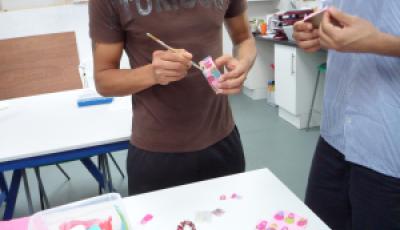Post by Mary Bosworth, Centre for Criminology, University of Oxford in which she explores an emotion not usually associated with immigration detention.
Recently, at the European Society of Criminology meeting in Prague, I was trying to convey to Ben Crewe the difference between the feel of immigration detention centres and prison, and the impact this distinction has on conducting research in them. People in detention are sadder, more anxious, extremely depressed, I said. It’s different to prison since they’re having to manage not just their confinement, but also their fears about the future. There’s very little banter. People are preoccupied and distracted. As a result, research often feels intrusive, beside the point, and a bit embarrassing. Why should they talk to me if they’re really just worrying about leaving their kids behind?
“So, is there no joy in detention then?” Ben asked. “No,” I replied categorically. “There is no joy.”
Just the other day, however, when I was back in detention, chatting to some of the men and staff in Campsfield House IRC, I started thinking about that conversation. Is it really true that there is no joy here, I wondered? Or have I misrepresented the quality of these places in my attempt to differentiate them from prison? What would a totally joyless institution look like, and is this one?

From Tunisia, the men switched between Arabic, French, and English, making jokes and messing about. The father, who had been injured at work, lacked the manual dexterity to thread the beads. His friend, in any case, thought he knew better, and rapidly took over, admonishing the other man for sloppy work and taking too long. “My daughter loves pink,” her father said. “What about some bling?” his friend asked. Poring over the bead selection, they carefully chose red and gold beads of varying size with a few pink ones for detail. After a few false starts, and queries over the length of three year old’s wrist, they were done.
Once that mission was complete, the teacher suggested making a gift box. Rifling through the selection of tissue paper they found some hot pink decorated with dolls: “Perfect!” said the dad.
Over two hours later the gift and its gift box were finished, and the men, neither of whom had made jewellery or done decoupage before, were rightfully proud of their creation. During the course of making it, we discussed the pleasure of daughters, their obsession with art and craft at home, the irritations of mess, and some failed cake making. Of course all of this conversation happened in the framework of the father’s anxiety about removal, and his worry that he would be separated from his child. However, with the support of the teacher and his friend he was not only able to fulfil his parental role by making her a gift but also to have some fun.

Speaking of ‘joy’ in immigration detention feels problematic. Certainly it’s important not to underestimate the suffering that many endure. Yet, to overlook the efforts of some staff and detainees in supporting one another, and their moments of happiness or achievement, would not only do them a disservice but also fails to recognise the familiarity of their aspirations and experiences. Moments of joy may be fleeting, and, in immigration detention, they will usually be surrounded by pain, regret, and confusion. However, even in the most adverse circumstances, people tend to reach out to others to create relationships and connections. These attempts, in sites where people have been designated unwelcome, are inherently destabilising of the institutions' exclusionary logic, and, for that reason, deserve celebration and greater scholarly attention.
So, to Ben Crewe, I think I would now say, yes, there is some joy in immigration detention. It sometimes flows from deliberate actions of considerate staff; at other times it’s a result of friendships forged among detainees. Often it appears when people discuss their children, their friends, their mums, their lives outside. It might be present in the gym, or part of a day spent in the cultural kitchen. Many find it in worship or on the phone. In most cases, positive emotions are hard to maintain, as people are usually overwhelmed by the uncertainty of their immigration case, anxious about their separation. I would still say that British immigration removal centres don’t feel like prisons. Banter is less common, moods are generally low and anxieties run high. Yet precisely for all these reasons, moments of joy are even more precious and should recognised and celebrated as such.
Epilogue
I found out the following week that the father was almost immediately released. Hopefully he was able to enjoy his daughter’s birthday party and give her the bracelet himself. His friend, however, has not been so lucky. Last time I was there, he was still in Campsfield House, awaiting removal.
Any comments about this post? Get in touch with us! Send us an email, or post a comment here or on Facebook. You can also tweet us.
__________
How to cite this blog post (Harvard style): Bosworth M (2014) Is There Joy in Immigration Detention? Available at: http://bordercriminologies.law.ox.ac.uk/joy-in-immigration-detention/ (Accessed [date]).
Share:








